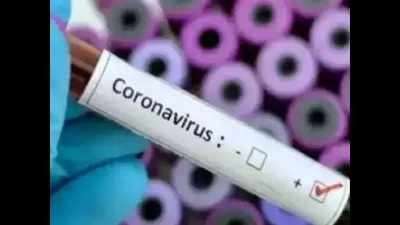- News
- City News
- bengaluru News
- Covid-19: Jayadeva says its survey hints at herd immunity
Trending
This story is from June 6, 2020
Covid-19: Jayadeva says its survey hints at herd immunity

Representative Image
BENGALURU: Doctors at Sri Jayadeva Institute of Cardiovascular Sciences and Research (SJICSR) say results of an in-house surveillance study suggest herd immunity to Covid-19 is developing.
One thousand SJICSR staffers were subjected to tests using ICMRapproved antibody rapid testing kits over the last fortnight. Ten were found positive for antibodies. The 10 then took an RT-PCR test, but were found negative for the virus.
“This proves the 10 staffers were infected, developed antibodies and overcame the virus.It is a hint that community immunity is developing,” said Dr CN Manjunath, director of the institute and a member of Karnataka’s Covid-19 taskforce.
The 10 staffers included nurses, ward helpers and two drivers. Four of them were women and none were doctors. The hospital used AB check antibodies Covid-19 rapid testing kits produced by Newlife unit in Noida. A total 450 men and 550 women, including doctors — all in the age group 30-40 years — were tested with the antibody rapid kits.
“IgG antibodies generally begin appearing two weeks after the onset of infection and stays in the body for several months after the infection is overcome,” the advisory stated. “Therefore, the IgG test is not useful to detect acute infection but indicates an episode of Sars-CoV-2 infection in the past.”
Dr Manjaunath said there is a need to replicate the test in different parts of the state to check if people are developing IgG antibodies. “We’ll replicate the survey in Kalaburagi and Mysuru units of SJICSR. Such studies will give us a clear picture of just where we stand,” he said.
Community immunity to any infection generally develops first among healthcare workers and among the contacts of the infected. The 10 SJICSR staff were not from a containment zone. They had commuted to and from work every day, even during the lockdown. The source of the infection in these 10 individuals remains a mystery.
“It’s unlikely they caught the infection in the hospital, although we had two heart patients who tested positive,” said Dr Manjunath. “No other patient at Jayadeva has tested positive.” However, a top community medicine expert said herd immunity is possible in Maharashtra or Delhi, but unlikely in Bengaluru.
“To understand herd immunity, we should be testing the general population and not healthcare workers from one hospital alone,” the expert said. “Healthcare workers are not representative of the entire community. But this is definitely a sign of the beginning of community spread.”
The expert added that a clearer picture will emerge when results of the ICMR community survey, that’s currently on in several parts of the state using antibody rapid testing kits, are revealed.
One thousand SJICSR staffers were subjected to tests using ICMRapproved antibody rapid testing kits over the last fortnight. Ten were found positive for antibodies. The 10 then took an RT-PCR test, but were found negative for the virus.
“This proves the 10 staffers were infected, developed antibodies and overcame the virus.It is a hint that community immunity is developing,” said Dr CN Manjunath, director of the institute and a member of Karnataka’s Covid-19 taskforce.
The 10 staffers included nurses, ward helpers and two drivers. Four of them were women and none were doctors. The hospital used AB check antibodies Covid-19 rapid testing kits produced by Newlife unit in Noida. A total 450 men and 550 women, including doctors — all in the age group 30-40 years — were tested with the antibody rapid kits.
A week ago, ICMR had issued an advisory to the states to conduct a serosurvey to find out how much of the population has been exposed to the virus. It suggested using IgG Elisa Test. IgG, as immunoglobulin G is known, is a type of antibody that fights the novel coronavirus.
“IgG antibodies generally begin appearing two weeks after the onset of infection and stays in the body for several months after the infection is overcome,” the advisory stated. “Therefore, the IgG test is not useful to detect acute infection but indicates an episode of Sars-CoV-2 infection in the past.”
Dr Manjaunath said there is a need to replicate the test in different parts of the state to check if people are developing IgG antibodies. “We’ll replicate the survey in Kalaburagi and Mysuru units of SJICSR. Such studies will give us a clear picture of just where we stand,” he said.
Community immunity to any infection generally develops first among healthcare workers and among the contacts of the infected. The 10 SJICSR staff were not from a containment zone. They had commuted to and from work every day, even during the lockdown. The source of the infection in these 10 individuals remains a mystery.
“It’s unlikely they caught the infection in the hospital, although we had two heart patients who tested positive,” said Dr Manjunath. “No other patient at Jayadeva has tested positive.” However, a top community medicine expert said herd immunity is possible in Maharashtra or Delhi, but unlikely in Bengaluru.
“To understand herd immunity, we should be testing the general population and not healthcare workers from one hospital alone,” the expert said. “Healthcare workers are not representative of the entire community. But this is definitely a sign of the beginning of community spread.”
The expert added that a clearer picture will emerge when results of the ICMR community survey, that’s currently on in several parts of the state using antibody rapid testing kits, are revealed.
End of Article
FOLLOW US ON SOCIAL MEDIA










